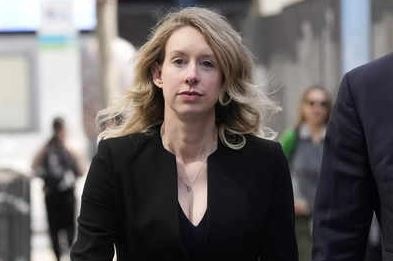On Tuesday, Theranos founder Elizabeth Holmes checked herself into a jail in Texas, where she faces up to 11 years in prison for her role in orchestrating a blood-testing fraud that has become a metaphor for Silicon Valley’s culture of excess and arrogance.
From the outside, two prison guards and Holmes, 39, were conversing as she entered the federal women’s prison camp in Bryan, Texas, wearing jeans and a brown jumper.
The federal judge who sentenced Holmes in November suggested that she be held in a minimum-security prison approximately 95 miles (150 kilometres) northwest of Houston, where she had spent her childhood hoping to one day become a technological genius like Apple’s co-founder Steve Jobs.
Holmes has two small children she must leave behind when she starts serving her sentence: a boy born in July 2021, just weeks before the commencement of her trial, and a girl born three months later, in January 2022, after she was convicted of four felony charges of fraud and conspiracy.
She was out on bond until Tuesday, and she and the children’s father, William “Billy” Evans, had been residing in the San Diego area. Holmes and her partner met in 2017 when she was under scrutiny for the demise of Theranos, the company she co-founded after dropping out of Stanford at the age of 19.Holmes had a strong relationship with Ramesh, “Sunny” Balwani, an investor and fellow executive at Theranos, when the two were working together in Palo Alto, California.
Holmes and Balwani claimed their company, Theranos, will transform medical diagnostics by using a finger prick blood sample to rapidly screen for illnesses and other health issues.
Despite Holmes and Balwani’s best efforts to prevent it, the situation detonated when the Wall Street Journal published a series of bombshell pieces detailing major, perhaps catastrophic faults in Theranos’ technology. After the Journal published its exposé, the relationship between Holmes and Balwani, who had been living together in secret while operating Theranos, dissolved.
Holmes testified for seven interesting days during her trial, during which she confessed making errors at Theranos but maintained her innocence of any criminal wrongdoing. She testified that Balwani subjected her to emotional and sexual abuse, and that his dominance over her impeded her ability to think clearly. Balwani’s lawyer refuted Holmes’s accusations without wavering, which was a major factor in the decision to try them separately.
Two months after Holmes’ trial concluded, the trial of 57-year-old Balwani started. He was found guilty on 12 charges of fraud and conspiracy. He has been incarcerated in Southern California for the better part of 13 years now.
Holmes argued that she should be allowed to stay free until the outcome of her appeal since she had been treated unjustly throughout her trial. U.S. District Judge Edward Davila, who presided over her trial, and the Ninth Circuit Court of Appeals both denied her appeal, leaving her with little choice but to continue the path that would lead her to jail over 20 years after she started Theranos.
When The Associated Press reached out to Holmes’ lawyers on Tuesday for comment, they did not immediately answer.
The lowest security risk inmates are housed in federal prison camps that don’t even have fencing. Many inmates in prison camps are forced to labour for the jail due to a lack of personnel.
Inmates at FPC Bryan in Texas may earn anything from 12 cents to $1.15 per hour working in the prison’s food service or one of the Federal Prison Industries’ factories, according to the facility’s 2016 prisoner handbook.
Low-security federal prison camps were established initially so that offenders could conduct prison-related jobs like gardening and maintenance without having to check in and out of the main jail facility on a regular basis. However, the lackadaisical approach to security allowed for the entry of illegal substances, mobile phones, and firearms. Prison breakouts have increased as a result of lax security.
A guy doing time at another federal prison camp in Arizona attempted to kill his wife in the head with a pistol he had smuggled in during a visit in the middle of November. No one was hurt because the pistol jammed. However, because of the serious security issues that were revealed, the agency head has ordered a review of all security measures at federal prison camps throughout the United States.

